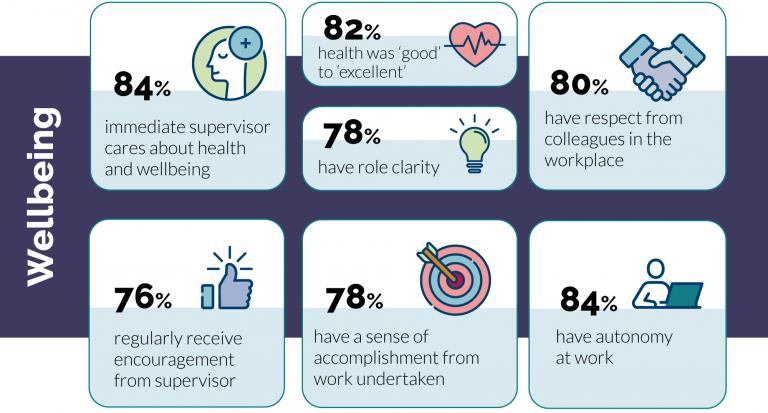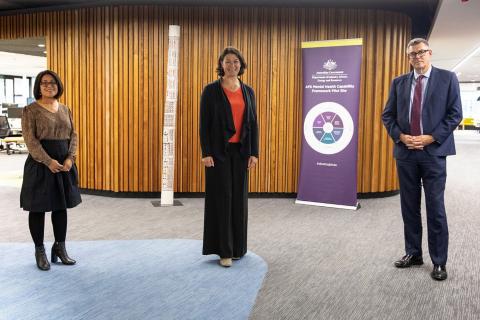Resilient workforce
Probably the one thing that I’m most proud of is how, through all of this really incredibly stressful time … I can’t think of a harsh word that was exchanged amongst the teams, that people were kind with one another and helpful. We had a roster at one stage to try and give people three hours off a week, and people were just jumping up and down to say, “No, so-and-so needs a break, and so-and-so needs a break”.47
Caroline Edwards PSM, then Associate Secretary, Department of Health
The pandemic has forced the APS to redefine its working space. Employees across Australia have experienced stay-at-home orders, with many juggling home schooling, separation from friends and family, and other hardships. The line between when work ends and home begins can become blurred, and the importance of a work/life balance becomes even more critical.
Given the additional pressures present while responding to crises, new measurements were introduced into the 2020 APS Employee Census to identify and track wellbeing among APS employees. While some employees have reported a positive (21%) change to their general health and wellbeing since COVID-19, others have seen a negative impact (32%).48
In the past year, at least 1 in 3 respondents indicated that they often find their work stressful, and report feeling burned out (34%). However, a large majority indicate they have supportive supervisors who care about their health and wellbeing (84%) and that they are surrounded by a team that works well together to ‘get the job done’ (87%).

Since 2018, the APS Employee Census has asked questions that comprise the APS Wellbeing Index, a measure of the practical and cultural elements known to assist a healthy and sustainable workplace. In 2021, the APS Wellbeing Index score was 68%, showing a small drop from 2020 (70%), though still higher than in 2019 (67%). The decline can be attributed to lower levels of satisfaction with the communication and promotion of wellbeing support measures.49 Employee satisfaction with communication in 2020 was very high after the onset of the pandemic (48% satisfied in 2019 up to 58% in 2020). This reflects the deliberate actions agencies and senior leaders took to communicate with employees as the response to COVID-19 unfolded. Agencies specifically focused on the wellbeing of their employees as they managed the changing situation. As a result, APS Employee Census results show a large improvement from pre-COVID results on the proportion of employees who agree that change is managed well in their agency (39% in 2019 up to 48% in 2020).50
As Australia and the world transitions to ‘normal’, the APS should not become complacent in valuing and prioritising the wellbeing of its employees. Employee wellbeing has long been linked to employee engagement, individual performance and organisational productivity.51 International research also suggests that employees in a post-COVID world will seek out employers who emphasise wellbeing.52
In driving mental health and wellbeing initiatives, APS agencies have recognised that while staff may be physically distanced, social connection is crucial to overall wellbeing. Agencies have incorporated new and innovative ways to connect such as structured social catch-ups alongside business meetings, virtual training programs, regular team stand-ups, and wellbeing information sessions with experts.
To further support the workforce, an APS Mental Health Capability Framework has been co-designed with input from across the APS to assist agencies to develop and implement evidence-informed mental health and suicide prevention initiatives.
Improving APS mental health and suicide prevention capability
The APS Mental Health Capability Project, commissioned by the Secretaries Board in late 2018, was the first service-wide review into the mental health capability of the APS workforce. The project was led by a taskforce within the Department of Industry, Science, Energy and Resources.

Operating Officer, NIAA; Ray Griggs AO CSC, former Chief Executive Officer, NIAA
Over 16,000 APS staff from more than 100 agencies participated in the project. The taskforce consulted extensively with subject matter experts, employees with lived experience of mental illness, and those who were carers of people with lived experience.
The review resulted in the design of an APS Mental Health Capability Framework to drive an increase in mental health capability at both an organisational and individual level. To test how the framework translated in a range of operating contexts, pilot programs were undertaken during 2020 with the Attorney-General’s Department, the Department of Home Affairs and the National Indigenous Australians Agency (NIAA). Further, Geoscience Australia and IP Australia tested the adaptability of the framework by implementing it without a high level of support from the taskforce.
In August 2021 the Secretaries Board endorsed project recommendations to align agency practices with the framework and establish the APS Mental Health and Suicide Prevention Unit.
The unit now operates out of the APSC, promoting whole-of-service development of workforce literacy, capability and expertise in mental health and suicide prevention. Ongoing collaboration and input from APS leaders, employees with lived experience, carers and people from diverse backgrounds, are critical enablers for the unit’s work. This work builds on the Productivity Commission’s Inquiry Report into mental health53 and the National Suicide Prevention Adviser’s recommendations highlighting the importance of building public sector mental health and suicide prevention capability.54.
47Caroline Edwards PSM, then Associate Secretary, Department of Health (2021). IPAA Work with Purpose Podcast Special Anniversary Edition. 29 April.
482020 APS Employee Census. No change (47%).
492021 APS Employee Census.
502019 and 2020 APS Employee Census.
51Nielsen, K., et al. (2017). Workplace resources to improve both employee well-being and performance: A systematic review and meta-analysis. 24 March.
52Morgan, I. (2021). Employees Want Wellbeing From Their Job, and They’ll Leave to Find It. 3 August.
53Productivity Commission. (2020). Mental Health: Productivity Commission Inquiry Report. 16 November.
54National Suicide Prevention Taskforce. (2021). National Suicide Prevention Adviser – final advice. 19 April.



